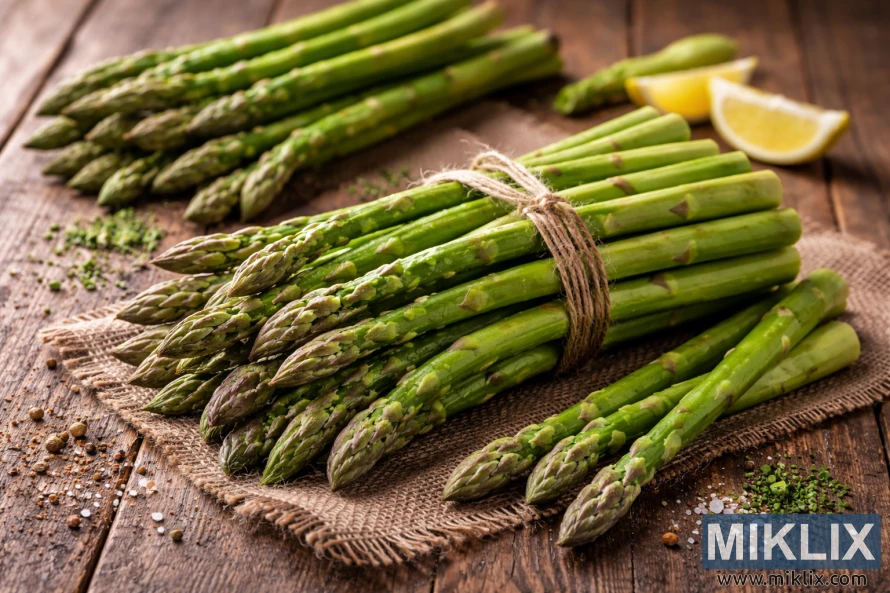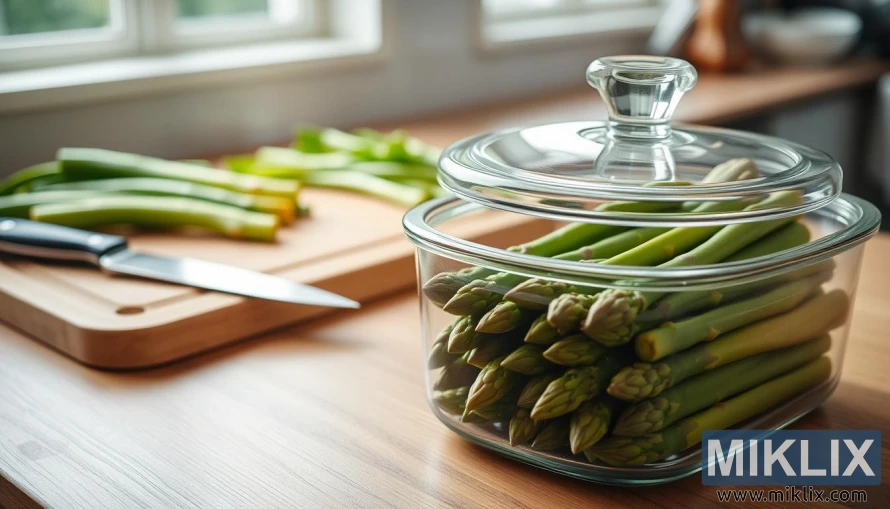Eating Green: How Asparagus Fuels a Healthier Life
Published: May 21, 2025 at 10:08:38 AM UTC
Last updated: December 24, 2025 at 9:37:43 AM UTC
Asparagus, known scientifically as Asparagus officinalis, is a tasty veggie from the lily family. It's famous for its unique taste and is packed with nutrients. This makes it a great choice for anyone looking to boost their health. It's low in calories but high in nutritional value. Asparagus is full of vitamins, minerals, and antioxidants. You can enjoy it raw or cooked, adding flavor and health benefits to your meals.

Eating asparagus can improve your health in many ways. It supports digestion and boosts your immune system. Its versatility in cooking makes it a favorite in kitchens across the United States.
Key Takeaways
- Asparagus is nutrient-dense, providing many health benefits.
- This veggie supports digestive health and immune function.
- It's low in calories, fitting well into any diet.
- Asparagus is versatile in cooking, improving many dishes.
- Its antioxidants help with overall well-being.
Nutritional Profile of Asparagus
Asparagus is very low in calories, with only 20 calories in half a cup (90 g) of cooked asparagus. This small amount is packed with nutrients, making it great for those who care about their health.
A half-cup of cooked asparagus has about 2.2 g of protein, 0.2 g of fat, and 1.8 g of dietary fiber. This mix helps keep you healthy and full.
Looking at the vitamins and minerals in asparagus, it's clear why it's so good for you. It's full of:
- Vitamin C (12% of RDI)
- Vitamin A (18% of RDI)
- Vitamin K (57% of RDI)
- Folate (34% of RDI)
- Potassium (6% of RDI)
With so many nutrients, asparagus is known as a nutrient-dense food. It's perfect for adding to a healthy diet.
Antioxidant Properties of Asparagus
Asparagus is full of antioxidants that help keep you healthy. These compounds fight off free radicals, which can harm cells. This reduces the chance of getting sick from oxidative stress.
Some key antioxidants in asparagus are Vitamin C, Vitamin E, glutathione, and flavonoids like quercetin and kaempferol. These help protect cells and keep them healthy.
Asparagus antioxidants do more than just protect cells. They also help fight chronic inflammation, which is good for your heart. Purple asparagus has anthocyanins, adding more antioxidant power. This makes it even better at fighting oxidative stress.
Asparagus and Digestive Health
Asparagus is great for your digestive health, thanks to its high fiber content. A typical serving has 1.8 grams of fiber. This helps you meet your daily fiber needs, keeping your bowels regular and your digestive system working well.
The prebiotics in asparagus, like inulin, feed good bacteria in your gut. This can boost your gut health.
Studies suggest asparagus might have mild laxative effects. This can help with constipation for some. The fiber and prebiotics in asparagus work together to support a healthy digestive system. More research is needed, but adding asparagus to your meals can be beneficial for digestion.
Blood Sugar Regulation Benefits
Asparagus is getting attention for its role in controlling blood sugar. Studies show that asparagus extracts can lower blood sugar levels. This is as effective as some diabetes medicines in animal tests.
Asparagus might help improve how well the body uses insulin. This is key for managing diabetes. It could also reduce damage caused by free radicals. But, we need more studies on humans to confirm these benefits.

Cholesterol and Blood Pressure Reduction
Asparagus is great for heart health because it can lower cholesterol and blood pressure. Studies show it helps bind bile acids in the gut. This makes asparagus special among vegetables.
Animal studies suggest asparagus can improve lipid metabolism. This might help lower cholesterol. But, more research in humans is needed to confirm these benefits.
Eating asparagus can be a tasty way to help manage cholesterol and blood pressure. It's a good choice for those looking to improve their heart health.
Cancer-Fighting Properties of Asparagus
Asparagus might help prevent cancer. It has compounds like saponins and polysaccharides that could fight cancer. These might help reduce stress and inflammation, which are key in cancer growth.
Studies show asparagus could help against breast and pancreatic cancer. It's good for the immune system, which fights off bad cells. More research is needed to confirm these benefits. But adding asparagus to your diet could be a great way to stay healthy.
Support for Immune System Function
Asparagus is a great helper for boosting your immune system. It makes red and white blood cells work better. These cells are key in fighting off sickness.
Eating asparagus often can also increase antibody production. This means your body can fight off infections more effectively.
Studies show that asparagus has antimicrobial properties. This could help stop harmful bacteria from growing. Early research suggests it might be effective against common pathogens. More studies are needed to fully understand its benefits, but it looks promising.
Asparagus and Weight Loss
Asparagus is a top pick for losing weight because it's low in calories but high in nutrients. It's a green veggie that's only about 20 calories per 100 grams. This makes it a great choice for anyone trying to lose weight.
The fiber in asparagus helps you feel full. This can help you eat less and lose weight. With its low calories and lots of fiber, asparagus is a smart food for keeping a healthy weight.
Adding asparagus to your meals can make them taste better and be healthier. Try it with lean proteins or other veggies. It's great in salads, stir-fries, or roasted dishes. It adds flavor and helps with weight management.

Potential Reproductive Health Benefits
Asparagus is great for reproductive health, making it a key part of a healthy diet. It's full of folate, which is good for reproductive wellness. This is very important during pregnancy because folate helps with fetal development and prevents birth defects.
Asparagus also has asparagusic acid, which is good for fertility. Studies show it might help balance hormones, making the reproductive system healthier. This is great for anyone wanting to boost their fertility.
Asparagus can also help with libido. It has compounds like protodioscin that may increase libido and testosterone. This is good news, even though more research is needed. The early results look promising for asparagus and reproductive health.
Other Health Benefits of Eating Asparagus
Asparagus is more than just a tasty veggie. It can also help you sleep better. This is because it has special compounds that might improve your sleep quality.
It's also good for your mood. Asparagus is full of folate, which helps control mood-related chemicals in your brain. Eating it might make you feel happier.
Asparagus can even help reduce stress. It has antioxidants that might calm you down. While most studies are on animals or in labs, adding asparagus to your meals could have many benefits.
Versatile Culinary Uses of Asparagus
Asparagus is a versatile vegetable with many uses in cooking. Learning how to cook asparagus can open up new meal ideas. You can enjoy it raw in salads for a fresh crunch or try different cooking methods like blanching, grilling, and sautéing.
There are many tasty asparagus recipes to try. Roasting asparagus with olive oil and sea salt makes a simple yet tasty dish. It goes well with many main courses. Asparagus also works great in stir-fries, adding flavor to other vegetables.
Don't miss out on creamy asparagus soup, which highlights its rich taste. When cooking asparagus, make sure not to overcook it. This keeps its color bright and its nutrients intact. Asparagus is a great addition to any kitchen.
Seasonality and Storage of Asparagus
Asparagus season is from spring to early summer. This is when it's at its best. Even though you can find asparagus all year, the peak season has the most vibrant and tasty stalks. When you buy fresh asparagus, look for stalks that are firm and bright green. They should not be wilted or brown.
Storing asparagus right is key to keeping its taste and nutrients. After you buy it, wash it and remove any rubber bands or ties. To keep it fresh, wrap the ends in a damp paper towel and put it in a plastic bag in the fridge. You can also stand the stalks upright in a container with water. Cover the tops loosely with a plastic bag. These methods help keep asparagus crisp and flavorful, so you can enjoy it at its best.

Choosing the Right Asparagus
When picking fresh asparagus, look for bright green stalks that are firm. They should be free of blemishes or soft spots. The look of asparagus can show its quality.
Choosing thicker stalks usually means juicier and tender spears. Thinner stalks might be a bit more fibrous. Each type of asparagus has its own flavor, making it versatile in cooking.
- Green Asparagus: The most common type, known for its sweet flavor.
- White Asparagus: Grown underground, it has a milder taste.
- Purple Asparagus: Sweeter than green varieties, with a hint of nuttiness.
Each type adds something special to your dishes, with different tastes and textures. Try different types from your local market to make your meals better. Whether you grill, steam, or roast, fresh asparagus will make your dishes stand out.
Asparagus Pairing Suggestions
Pairing asparagus with foods can make your meals even more enjoyable. Different asparagus flavor combinations can boost the taste and health benefits of your dishes. For example, hard-boiled eggs add protein and go well with asparagus. This makes a great salad option.
Asparagus also works well in salads, adding a fresh crunch. For appetizers, try it with cheese on crackers. Yogurt and lemon juice are great dipping sauces that add a refreshing touch.
Trying out different asparagus dish ideas can be fun. You can add it to pasta, risotto, or grill it as a side. Pairing asparagus with various foods creates delightful experiences for everyone.
Health Considerations with Asparagus
Asparagus is packed with nutrients and can be very healthy. But, it's not perfect for everyone, mainly those with certain health issues. People taking blood thinners like warfarin should watch out. This is because asparagus has a lot of Vitamin K, which can mess with blood thinners.
Some folks might get upset stomachs from eating too much asparagus. It's important to know how asparagus interacts with your diet. If you're not used to its fiber, eating it in small amounts is a good idea.
Here are some precautions when consuming asparagus:
- Monitor intake if on blood thinners.
- Start with small portions to gauge personal tolerance.
- Consider preparation methods that reduce fiber levels, such as steaming or pureeing.
Conclusion
Asparagus is packed with nutrients that boost your health. It's full of vitamins and minerals that keep you feeling good. Eating asparagus can help protect you from diseases and improve your digestion.
Asparagus is not just good for you; it's also tasty. You can add it to many dishes, making your meals healthier and more fun. This makes it easy to enjoy the benefits of asparagus every day.
Asparagus is low in calories but high in nutrients, making it a superfood. Adding it to your meals regularly can improve your health over time. It's a great reason to make asparagus a part of your daily cooking.

Further Reading
If you enjoyed this post, you may also like these suggestions:
- Tropical Treasure: Unlocking the Healing Powers of Coconuts
- The Power of Grapefruit: A Superfruit for Better Health
- Kiwis Uncovered: The Small Fruit with Superpowered Benefits
